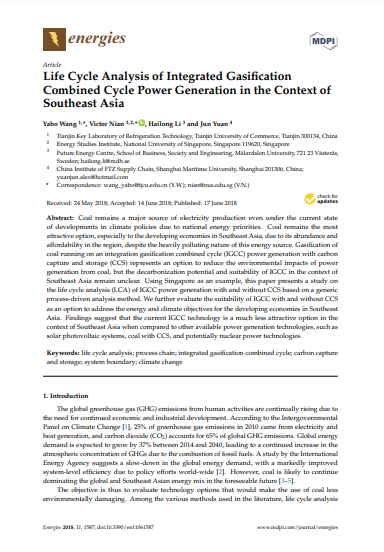
Keyword(s)
Author(s)
Yabo Wang (a), Victor Nian (a, b), Hailong Li (c), Jun Yuan (d)
Country(ies)
Publisher
Published Date
Access
DOI
Coal remains a major source of electricity production even under the current state of developments in climate policies due to national energy priorities. Coal remains the most attractive option, especially to the developing economies in Southeast Asia, due to its abundance and affordability in the region, despite the heavily polluting nature of this energy source. Gasification of coal running on an integration gasification combined cycle (IGCC) power generation with carbon capture and storage (CCS) represents an option to reduce the environmental impacts of power generation from coal, but the decarbonization potential and suitability of IGCC in the context of Southeast Asia remain unclear. Using Singapore as an example, this paper presents a study on the life cycle analysis (LCA) of IGCC power generation with and without CCS based on a generic process-driven analysis method. We further evaluate the suitability of IGCC with and without CCS as an option to address the energy and climate objectives for the developing economies in Southeast Asia. Findings suggest that the current IGCC technology is a much less attractive option in the context of Southeast Asia when compared to other available power generation technologies, such as solar photovoltaic systems, coal with CCS, and potentially nuclear power technologies.
Cite
Wang, Y.; Nian, V.; Li, H.; Yuan, J. Life Cycle Analysis of Integrated Gasification Combined Cycle Power Generation in the Context of Southeast Asia. Energies 2018, 11, 1587. https://doi.org/10.3390/en11061587